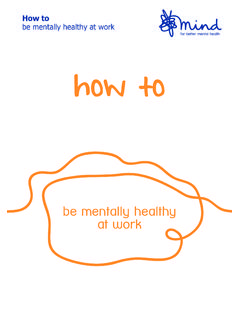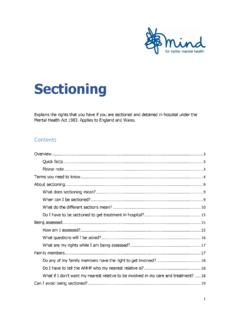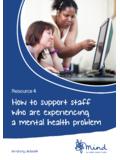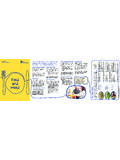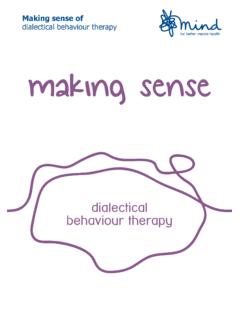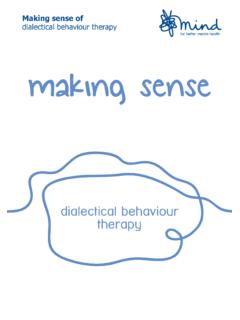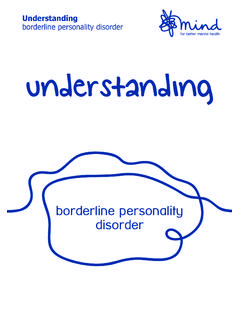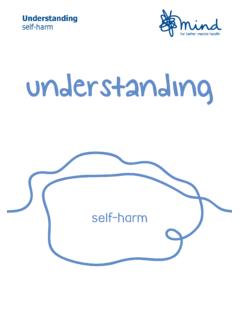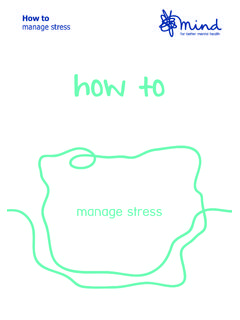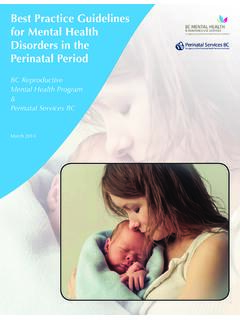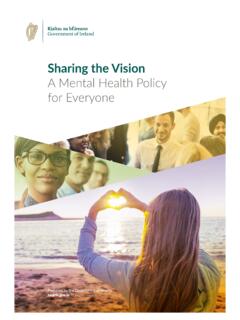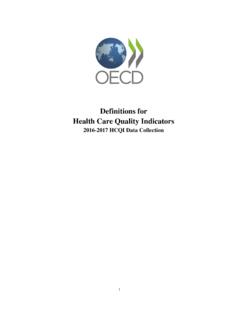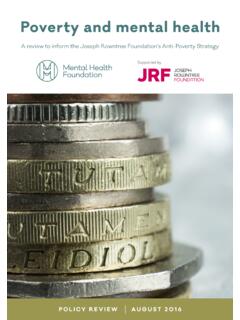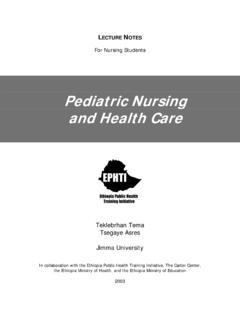Transcription of Anxiety and panic attacks - Mind, the mental health charity
1 Mind 2021 1 Anxiety and panic attacks Explains Anxiety and panic attacks , including possible causes and how you can access treatment and support. Includes tips for helping yourself, and guidance for friends and family. If you require this information in Word document format for compatibility with screen readers, please email: Contents What is Anxiety ? .. 2 What are Anxiety disorders? .. 3 What are the symptoms of Anxiety ? .. 4 What is a panic attack? .. 7 What causes Anxiety ? .. 9 How can I help myself?.
2 11 What treatments are available? .. 15 How can other people help? .. 18 Useful 21 Mind 2021 2 What is Anxiety ? Anxiety is what we feel when we are worried, tense or afraid particularly about things that are about to happen, or which we think could happen in the future. Anxiety is a natural human response when we feel that we are under threat. It can be experienced through our thoughts, feelings and physical sensations. "For me, Anxiety feels as if everyone in the world is waiting for me to trip up, so that they can laugh at me.
3 It makes me feel nervous and unsure whether the next step I take is the best way forward." Most people feel anxious at times. It's particularly common to experience some Anxiety while coping with stressful events or changes, especially if they could have a big impact on your life. See our information on how to manage stress for more information about stress. If you are feeling anxious or experiencing a panic attack right now, see our information on how to manage panic attacks . What is the 'fight, flight or freeze' response?
4 Like all animals, human beings have evolved ways to help us protect ourselves from danger. When we feel under threat our bodies react by releasing certain hormones, such as adrenaline and cortisol, which can be helpful. These hormones: make us feel more alert, so we can act faster make our hearts beat faster, quickly sending blood to where it's needed most. After we feel the threat has passed, our bodies release other hormones to help our muscles relax. This can sometimes cause us to shake. This is commonly called the 'fight, flight or freeze' response it's something that happens automatically in our bodies, and we have no control over it.
5 "Going out of the house is a challenge because I have a fear of panicking and feel that I'm being watched or judged. It's just horrible. I want to get help but I'm afraid of being judged." When is Anxiety a mental health problem? Anxiety can become a mental health problem if it impacts your ability to live your life as fully as you want to. For example, it may be a problem if: Mind 2021 3 your feelings of Anxiety are very strong or last for a long time your fears or worries are out of proportion to the situation you avoid situations that might cause you to feel anxious your worries feel very distressing or are hard to control you regularly experience symptoms of Anxiety , which could include panic attacks you find it hard to go about your everyday life or do things you enjoy.
6 If your symptoms fit a particular set of medical criteria then you might be diagnosed with a particular Anxiety disorder. But it's also possible to experience problems with Anxiety without having a specific diagnosis. Our sections on self-care and treatment for Anxiety offer suggestions for help and support. "You know that feeling when you're rocking on the back legs of your chair and suddenly for a split second you think you're about to fall; that feeling in your chest? Imagine that split second feeling being frozen in time and lodged in your chest for hours/days, and imagine with it that sense of dread sticking around too, but sometimes you don't even know why.
7 " What are Anxiety disorders? Anxiety can be experienced in lots of different ways. If your experiences meet certain criteria your doctor might diagnose you with a specific Anxiety disorder. Some commonly diagnosed Anxiety disorders are: Generalised Anxiety disorder (GAD) this means having regular or uncontrollable worries about many different things in your everyday life. Because there are lots of possible symptoms of Anxiety this can be quite a broad diagnosis, meaning that the problems you experience with GAD might be quite different from another person's experiences.
8 Social Anxiety disorder this diagnosis means you experience extreme fear or Anxiety triggered by social situations (such as parties, workplaces, or everyday situations where you have to talk to another person). It is also known as social phobia. See our section on types of phobia for more information. panic disorder this means having regular or frequent panic attacks without a clear cause or trigger. Experiencing panic disorder can mean that you feel constantly afraid of having another panic attack, to the point that this fear itself can trigger your panic attacks .
9 See our section on panic attacks for more information. Phobias a phobia is an extreme fear or Anxiety triggered by a particular situation (such as going outside) or a particular object (such as spiders). See our resource on phobias for more information. Post-traumatic stress disorder (PTSD) this is a diagnosis you may be given if you develop Anxiety problems after going through something you found traumatic. PTSD can involve experiencing flashbacks or nightmares which can feel like you're Mind 2021 4 re-living all the fear and Anxiety you experienced at the time of the traumatic events.
10 See our resource on PTSD and complex PTSD for more information. Obsessive-compulsive disorder (OCD) you may be given this diagnosis if your Anxiety problems involve having repetitive thoughts, behaviours or urges. See our resource on OCD for more information. health Anxiety this means you experience obsessions and compulsions relating to illness, including researching symptoms or checking to see if you have them. It is related to OCD. You can find out more about health Anxiety on the Anxiety UK website. Body dysmorphic disorder (BDD) this means you experience obsessions and compulsions relating to your physical appearance.
